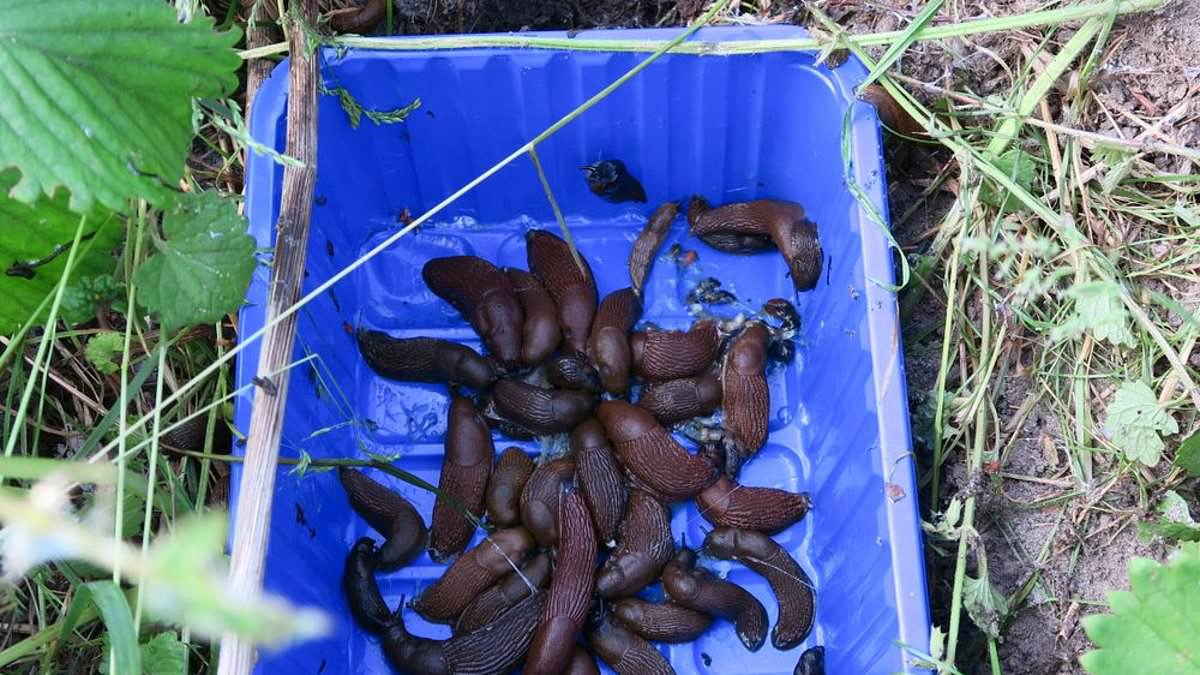Pesky slugs are the bane of gardeners’ lives and this summer they are wreaking havoc yet again.
These greasy gastropods are thriving in Britain’s gardens thanks to the damp conditions over the last few months.
There are more than 40 species of slugs in the UK. And while your garden may never be slug free, there are several things you can do to deter them from your sanctuary.
From copper wire, beer traps and even instant death, looks at the top 10 best ways to stop the slugs destroying your beloved plants.
Beer traps
If you can spare a few drops of your beers, this is a great way to keep slugs away.
Make a slug trap using cheap beer and they will be attarcted to the smell.
You should bury shallow plastic containers around your garden, with the rim just above soil level.
Half fill the container with beer and the cover with a loose lid to stop other creatures falling in.
It’s best to put the trap on the edge of a border so that the slugs don’t eat your plants on their way.
Egg shells
Slugs are soft-bodied molluscs so sharp, prickly barriers are a brilliant way to deter them from your beloved plants.
Always make sure the egg shells are clean as they can attract rodents.
You should collect and wash the egg shells before heating them in the oven to make them harder.
Use a food processor to crush the egg shells and then place a protective ring around your seeds.
Sawdust, sand and seaweed are also good alternatives.
Encourage predators
Predators should be welcomed in gardens to enhance the biodiversity.
But they can also help minimise slug and snail damage.
Birds, frogs, toads, beetles and hedgehogs all enjoy snacking on slugs.
Raking over soil and removing fallen leaves during winter can allow birds to eat slug eggs that have been exposed.
Copper tape
Adding copper tape to the top of plant pots is a nice easy way to deter slugs from invading your gardens.
Copper reacts with slug slime, giving them a tiny electric shock each time they come into contact with it.
This won’t cause them any serious harm or long-term damage, but will be enough to stop them from attacking your plants.
Traps
If you don’t want to kill the slugs you can trap them safely by covering an area with cardboard or black plastic before sowing.
They will hide underneath so you can pick them off a few days later.
Slugs are also big fans of grapefruit so you can leave the halves out, enticing the molluscs to climb in and trap themselves.
Coffee grounds
Slugs and snails hate coffee and sprinkling some around plant bases will act as a repellent.
You can also spray cold, strong coffee on them.
Diatomaceous earth
The naturally occurring compound can be sprinkled around garden beds or individual plants to deter slugs.
You can also mix it with water to make a foliar spray.
Planting flowers and herbs
Gardening broadcast legend Alan Titchmarsh has four different flowers which are best for keeping the pesky gastropods away.
They are ferns, geraniums, alchemillas and fuchsias and penstemons.
Garlic
Slugs do not like the smell of garlic so you could crush a clove and add it to a watering can.
Instant death
If none of the other options are working, then there is always a last resort.
Gardeners can drown slugs by putting them in a jar filled with water and keeping the lid screwed on tight.
You can also use a sharp knife and cut the slug in half for the quickest death.
There are also a number of methods to avoid when it comes to tackling slugs.
Dr Andrew Salisbury, who is head of plant health at the Royal Horticultural Society told : ‘Please don’t use salt, it is indiscriminate and a particularly unpleasant and inefficient way to kill a slug or any other animal, high concentrations of salt may also damage plants.’
He added: ‘Slug pellets, even organic ones, have been shown to have negative effects on wildlife in the garden.
‘It’s better to encourage natural predators and tailor planting to more resistant plants then only if it remains necessary use methods such as collecting and moving them, and biological control.’
